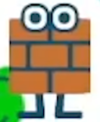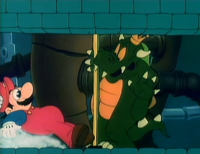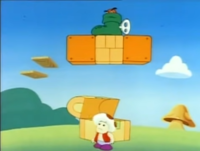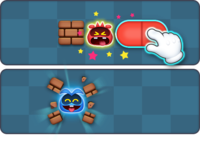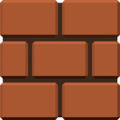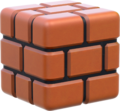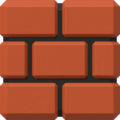Brick Block: Difference between revisions
(→Super Mario Run: Excising most of this update stuff in favor of talking about Kingdom Builder! And Cutting Edge Spire being weird.) |
|||
| Line 188: | Line 188: | ||
===Names in other languages=== | ===Names in other languages=== | ||
{{foreign names | {{foreign names | ||
|Jap=レンガ | |Jap=レンガ | ||
|JapR=Renga | |JapR=Renga | ||
|JapM=Brick | |||
|JapC=<ref>{{cite|title=スーパーマリオブラザーズ (''Sūpā Mario Burazāzu'') instruction booklet|page=8|date=1985|language=ja|publisher=Nintendo}}</ref> | |||
|Jap2=レンガブロック | |Jap2=レンガブロック | ||
|Jap2R=Renga Burokku | |Jap2R=Renga Burokku | ||
|Jap3=ブロック | |Jap2M=Brick Block | ||
|Jap3=ブロック | |||
|Jap3R=Burokku | |Jap3R=Burokku | ||
| | |Jap3M=Block | ||
|Jap3C=<ref>{{cite|title=スーパーマリオランド (''Sūpā Mario Rando'') instruction booklet|page=7 and 11|publisher=Nintendo|date=1989|language=ja}}</ref> | |||
|Jap3N=''Super Mario Land'' | |||
|Jap4=ニコニコブロック | |||
|Jap4R=Nikoniko Burokku | |Jap4R=Nikoniko Burokku | ||
| | |Jap4M=Smiley Block | ||
| | |Jap4C=<ref>{{cite|publisher=[[Shogakukan]]|language=ja|date=2015|title=''Super Mario Bros. Hyakka: Nintendo Kōshiki Guidebook'', ''Super Mario Land 2: 6 Golden Coins'' section|page=78}}</ref> | ||
| | |Jap4N=''Super Mario Land 2: 6 Golden Coins'' | ||
| | |Cat=Bloc maó | ||
|Cat=Bloc maó | |||
|CatM=Brick block | |CatM=Brick block | ||
| | |CatN=''The Super Mario Bros. Movie'' | ||
| | |ChiS=砖头砖块 | ||
| | |ChiSR=Zhuāntóu Zhuānkuài | ||
| | |ChiSM=Brick Block | ||
| | |ChiSC=<ref>{{cite|url=www.ique.com/games/Mariobros/newmario.htm|title=New 超级马力欧兄弟|publisher=iQue|language=zh-hans|accessdate=March 6, 2020}}</ref> | ||
| | |ChiSN=''New Super Mario Bros.'' | ||
| | |ChiS2=砖块 | ||
| | |ChiS2R=Zhuānkuài | ||
| | |ChiS2M=Block | ||
| | |ChiS2N=''Super Mario Maker 2'' | ||
|Fre=Bloc | |ChiT=磚塊 | ||
|ChiTR=Zhuānkuài | |||
|ChiTM=Block | |||
|Dut=Blok | |||
|DutM=Block | |||
|DutN=''Super Mario Maker 2'' | |||
|Dut2=Stenen blok | |||
|Dut2M=Rock Block | |||
|Dut2N=''Super Mario Run'' | |||
|Dut3=Baksteenblok | |||
|Dut3M=Brick Block | |||
|Fre=Bloc | |||
|FreM=Block | |||
|FreN=''Super Mario Run, Super Mario Maker 2'' | |||
|Fre2=Brique | |Fre2=Brique | ||
|Fre2M=Brick | |||
|Fre3=Bloc de brique | |Fre3=Bloc de brique | ||
|Fre3M=Brick block | |Fre3M=Brick block | ||
|Fre4=Bloc Brique | |||
|Fre4M=Brick Block | |Fre4M=Brick Block | ||
|Fre4C=<ref>{{cite|title=''Super Mario Advance 4: Super Mario Bros. 3'' instruction booklet|page=52|date=2003|language=fr|publisher=Nintendo of Europe}}</ref> | |||
|Fre5=Bloc normal | |||
|Fre5M=Normal block | |Fre5M=Normal block | ||
| | |Fre5N=''Super Mario All-Stars'' | ||
|Ger=Mauerstein | |Ger=Mauerstein | ||
|GerM=Brick | |GerM=Brick | ||
|Ger2=Ziegelblock | |||
|Ger2M=Brick block | |Ger2M=Brick block | ||
|Ger2C=<ref>{{cite|title=''Super Mario Advance 4: Super Mario Bros. 3'' instruction booklet|page=32|date=2003|language=de|publisher=Nintendo of Europe}}</ref> | |||
|Ger3=Block | |||
|Ger3M=Block | |Ger3M=Block | ||
| | |Ger3N=''Paper Mario: The Origami King'' | ||
| | |Ita=Mattone | ||
|ItaM=Brick | |ItaM=Brick | ||
|ItaC=<ref>{{cite|title=''[[Super Mario Bros.]]'' Italian manual|page=18}}</ref><ref>{{cite|title=''[[Super Mario Bros. 3]]'' Italian manual|page=17}}</ref><ref>{{cite|title=''[[Classic NES Series]]'' ''[[Super Mario Bros.]]'' manual|page=107|publisher=Nintendo of Europe|language=it|date=2004}}</ref> | |||
|Ita2=Blocco Normale | |||
|Ita2M=Normal Block | |Ita2M=Normal Block | ||
|Ita2C=<ref>{{cite|title=''[[Super Mario All-Stars]]'' Italian manual|page=9|publisher=Nintendo of Europe|language=it|date=1993}}</ref> | |||
|Ita3=Blocco | |||
|Ita3M=Block | |Ita3M=Block | ||
|Ita3C=<ref>{{cite|title=''[[Super Mario Bros. 3]]'' (3DS - [[Virtual Console]]) Italian e-manual|page=13}}</ref><ref>{{cite|title=''[[Super Mario Land]]'' (3DS - [[Virtual Console]]) Italian e-manual|page=10}}</ref> | |||
|Ita4=Blocco mattone | |||
|Ita4M=Brick-Block | |Ita4M=Brick-Block | ||
|Kor=블록 | |||
|KorR=Beullok | |||
|KorM=Block | |||
|Por=Bloco | |Por=Bloco | ||
|PorM=Block | |PorM=Block | ||
| Line 247: | Line 268: | ||
|RusR=Blok | |RusR=Blok | ||
|RusM=Block | |RusM=Block | ||
| | |SpaA=Bloque de ladrillo | ||
| | |SpaAM=Brick Block | ||
| | |SpaAN=''Super Mario Run'' | ||
| | |SpaA2=Bloque Ladrillo | ||
| | |SpaA2M=Brick Block | ||
| | |SpaE=Bloque | ||
| | |SpaEM=Block | ||
| | |SpaEN=''Super Mario Run'' | ||
| | |SpaE2=Bloque Ladrillo | ||
| | |SpaE2M=Brick Block | ||
| | |SpaE3=Bloque de ladrillos | ||
| | |SpaE3M=Block of bricks | ||
|SpaE3C=<ref>{{cite|title=''Super Mario Advance 4: Super Mario Bros. 3'' instruction booklet|page=92|date=2003|language=es-es|publisher=Nintendo of Europe}}</ref> | |||
}} | }} | ||
Revision as of 22:21, October 13, 2024
It has been requested that this article be rewritten and expanded to include more information. Reason: Include missing information on appearances in several series, including, but most likely not limited to, Mario Kart, Mario Party, Super Mario Land, Mario + Rabbids (tagged on March 17, 2020)
| Brick Block | |
|---|---|
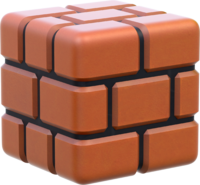 Artwork of a Brick Block from Super Mario 3D World | |
| First appearance | Super Mario Bros. (1985) |
| Latest appearance | Nintendo World Championships: NES Edition (2024) |
| Effect | Releases items, serves as a platform, or simply breaks apart when struck |
A Brick Block (or brick block), sometimes simply known as a brick,[1][2] regular block,[3] Normal Block,[4] or Block,[5] is a recurring type of block either textured or designed to resemble a brick wall. Brick Blocks have appeared in nearly every game of the Super Mario series to date.
In most Super Mario games since Super Mario Bros., Mario or any other character can break this block only in their Super form or higher tiered variants of the Super form, such as the Fire form or Tanooki form. Brick Blocks can be broken in many ways (usually just by jumping into them from below); they give the player ten points (50 in Super Mario Bros. and its derivatives). If Small Mario or Mini Mario hits a Brick Block, it just bounces up slightly. However, if Brick Blocks contain an item, they work just like ? Blocks, as the item pops out and the block turns into an Empty Block. Regardless, any enemies walking on the block will be injured. In Super Mario Bros. and the New Super Mario Bros. series, Brick Blocks' colors change to fit those of their environment (blue while underground, gray/white in castles, red in volcanic areas, etc.)
When a P Switch is activated, Brick Blocks turn into coins and vice versa, unless the Brick Block contains an item.
History
Super Mario series
Super Mario Bros. / Super Mario Bros.: The Lost Levels
Bricks debut in Super Mario Bros. and reappear in Super Mario Bros.: The Lost Levels, where they are used as containers and platforms. In World 8-3 of Super Mario Bros. and a few levels in The Lost Levels, the castle walls use the same brick styling as bricks, which can make them harder to see, as only the small white top of the block can be seen. This is alleviated in the Super Mario All-Stars versions, where the castle wall is replaced and Hidden Blocks replace the bricks. According to the game's manual, power-up-holding bricks[6] were one of several objects that Mushroom People were magically transformed into by Bowser.[7] The breakable ones, however, would seem to not be transformed Mushroom People. In the Super Mario All-Stars versions of both games, the player character will continue their upward momentum slightly after punching through a brick, rather than rebounding back down.
Super Mario Bros. 3
In Super Mario Bros. 3, bricks shimmer and are as yellow as ? Blocks due to graphical limitations on the NES. This carries over into the Super Mario All-Stars version and Super Mario Advance 4, where they both use the golden coin palette. They can now be broken by tail whips and kicked shells. Bigger versions of Brick Blocks first appear in Giant Land, though they function the same as their regular variant. The first level of Desert Land introduces Pile Driver Micro-Goombas that wear dull bricks (except in the All-Stars version, where their blocks shine like normal ones) and attempt to stomp Mario by hopping towards him.
Super Mario Land
In Super Mario Land, bricks are also referred to as blocks[8] but serve the same purpose.
Super Mario World
- Main article: Rotating Block
Brick Blocks were originally going to appear in Super Mario World, but were eventually scrapped and replaced by Rotating Blocks.
Super Mario Land 2: 6 Golden Coins
![]() In Super Mario Land 2: 6 Golden Coins, bricks have a different appearance, with closed, pleased eyes resembling the game's Fire Flower. Despite the change in appearance, they serve the exact same purpose.
In Super Mario Land 2: 6 Golden Coins, bricks have a different appearance, with closed, pleased eyes resembling the game's Fire Flower. Despite the change in appearance, they serve the exact same purpose.
Super Mario Sunshine
Making their 3D Super Mario debut, brick blocks (also referred to as sand bricks[9]) appear again in Super Mario Sunshine, where they are filled with sand inside. They work like they do in the 2D games, and occasionally contain 1-Up Mushrooms.
Super Mario 64 DS
In Super Mario 64 DS, generic blocks are re-skinned to resemble brick blocks, though they behave the same as in Super Mario 64. A different visual change is given to crates, however. They can be broken by most of Mario, Luigi, and Wario's attacks. There is also a large black variation of the block that can be broken only by Wario (although any player character can break it with the help of a mushroom). Yoshi cannot break any of them unless he is under the effects of a mushroom.
New Super Mario Bros. series
As of New Super Mario Bros., bricks can also be ground-pounded to break them. In the game's sequels, New Super Mario Bros. Wii, New Super Mario Bros. 2 and New Super Mario Bros. U, Brick Blocks function identically as in the first New Super Mario Bros.
Super Mario Galaxy / Super Mario Galaxy 2
Brick Blocks reappear in Super Mario Galaxy and its follow-up Super Mario Galaxy 2, resembling their original design due to having four layers of bricks. These Brick Blocks can only hold coins inside, but they always break apart when hit.
Super Mario 3D Land
Brick Blocks reappear in Super Mario 3D Land, working as they did in the 2D Super Mario games. Certain Brick Blocks hide Tail Wheels, which have the platforms they are on ascend when spun. Additionally, a Brick Block-like enemy known as the Fake Block is introduced. These enemies camouflage themselves with regular Brick Blocks, and attack when the player approaches them. Blokkabloks also have spiked Brick Blocks as segments; unlike normal Brick Blocks, theirs can be broken by Small Mario.
Super Mario 3D World / Super Mario 3D World + Bowser's Fury
Brick Blocks return in Super Mario 3D World and Super Mario 3D World + Bowser's Fury, working as they did in Super Mario 3D Land. Big Blocks also appear, and similar blocks known as Crystal Blocks also debut in this game.
Super Mario Maker / Super Mario Maker for Nintendo 3DS
Brick Blocks (referred to simply as Blocks) reappear in Super Mario Maker and Super Mario Maker for Nintendo 3DS as objects that can be placed into the level (excluding the Super Mario World style, where they are replaced by Rotating Blocks, which the game also labels simply as "Blocks"). They serve the same purpose as in most Super Mario games.
Super Mario Run
Brick Blocks reappear in Super Mario Run working as they do in other 2D Super Mario titles. Sometimes, they contain a Pink Coin, Purple Coin, or Black Coin inside. Cutting-Edge Spire has a section where Brick Blocks have to be broken by the player to advance, a rarity in 2D Super Mario games. Brick Blocks can only be broken by characters that are two blocks tall. In earlier versions of Super Mario Run prior to the Fall 2017 update, Peach, Toad, Toadette, and the Yoshis did not have Small forms and therefore always break Brick Blocks at the cost of dying whenever they take damage. In versions since the Fall 2017 update, said characters and Daisy have Small forms to shrink into when being hit, now functioning identically to Mario and Luigi.
Brick Blocks are buildings that can be purchased and placed in the Mushroom Kingdom in Kingdom Builder mode. They come in a number of variations with differing arrangements of Brick Blocks. Block A is a single Brick Block, taking up a 1x1 space. Block B is a pair of Brick Blocks placed side by side, taking up a 1x2 space. Block C is a pair of Brick Blocks with one on top of the other, taking up a 1x1 space. Block D is three Brick Blocks arranged in a "L" shape open to the right, taking up a 1x2 space. Block E is three Brick Blocks arranged in a "L" shape open to the left, taking up a 1x2 space. Block F is four Brick Blocks arranged in a square stacked upward, taking up a 1x2 space. Block E is available exclusively as a My Nintendo reward for 100 Platinum Points each, while the rest can be obtained by normal means in the Shop or the Bonus Game of Remix 10.
Mega Blocks also appear, as two buildings. A Mega Block building with just one Mega Block, and a Mega Blocks building consisting two Mega Blocks with one placed on top of the other.
Super Mario Odyssey
Brick Blocks appear again in Super Mario Odyssey, working the same as in previous games. They resemble their original design, as they have four layers of bricks. In the Wooded Kingdom, Brick Blocks are made out of stone.
Super Mario Maker 2
Brick Blocks (again simply called Blocks in the Course Maker, though referred to by their full name in Yamamura's Dojo) appear in Super Mario Maker 2, acting as they did in Super Mario Maker, with Rotating Blocks replacing them in the Super Mario World style. In the Super Mario 3D World style, Crystal Blocks replace regular Brick Blocks in the forest and underground themes, while Hard Blocks take the form of Rock Blocks.
A Brick Block with a pair of black feet and legs along with eyes, named Partrick, can be seen in the game's Story Mode, and appears next to Soundfrog in the level creation menu.
Super Mario Bros. Wonder
Brick Blocks reappear in Super Mario Bros. Wonder, working the same as they do in previous games.
DIC cartoons
The Super Mario Bros. Super Show!
In The Super Mario Bros. Super Show!, several bricks appear in the opening sequence.
The Adventures of Super Mario Bros. 3
In The Adventures of Super Mario Bros. 3, bricks often appear in the background. Some are used as destructible platforms, though. In "A Toadally Magical Adventure", rebelling pipe creatures that Toad made use the wand they stole to make a pile of bricks act like Pile Driver Micro-Goombas. In "Super Koopa", Mario calls a brick holding a Super Leaf a "Super Block".
Mario Party series
Mario Party
The Mario Party minigame Coin Block Bash involves the players breaking Brick Blocks to get coins.
Mario Party 9
In the Mario Party 9 minigame Growing Up, the players must hit a Brick Block according to a button that appears on a wheel, causing a vine to sprout from it. The player with the tallest vine growing out of their block wins.
Super Smash Bros. series
- SmashWiki article: Block § Brick Blocks
In the Super Smash Bros. games, Brick Blocks only appear in Super Mario stages, such as the Mushroom Kingdom of Super Smash Bros. (where they form a solid platform on the left side) and the Mushroom Kingdom of Super Smash Bros. Melee, Mushroomy Kingdom (where they are aged and more realistic, as with the rest of the stage), 3D Land, and possibly in Super Mario Maker (bar the Super Mario World style). They also appear in the 3DS version's Smash Run mode. They can be broken as in the Super Mario games, though they are a bit sturdier after Melee.
Paper Mario series
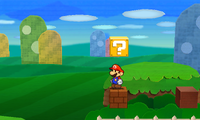
In the Paper Mario series, Brick Blocks primarily serve as breakable obstacles and do not often give out items like ? Blocks. In every game, regular ones can be broken with Mario's Jump and Hammer attacks.
Paper Mario
In Paper Mario, Brick Blocks can also be destroyed by Kooper's shell. Some ? Blocks are disguised as Brick Blocks.
Paper Mario: The Thousand-Year Door
In Paper Mario: The Thousand-Year Door, Brick Blocks serve a similar role to Paper Mario. They can sometimes contain coins. In the Super Bowser Bros. segments, four Brick Blocks clustered together appear to form larger ones.
Super Paper Mario
In Super Paper Mario, Brick Blocks can also be broken by using Bowser's Fire Breath or Ground Pounding on them with Thudley. Coin Blocks and certain ? Blocks are disguised as Brick Blocks from the front. The Flipside and Flopside Pit of 100 Trials have indestructible black Brick Blocks as their platforms.
Paper Mario: Sticker Star
Brick Blocks in Paper Mario: Sticker Star can be found commonly throughout the levels. Some ? Blocks are initially disguised as Brick Blocks.
Paper Mario: Color Splash
Brick Blocks in Paper Mario: Color Splash serve the same purpose as in Sticker Star. Giant Brick Blocks appear in Mondo Woods.
Paper Mario: The Origami King
Brick Blocks in Paper Mario: The Origami King appear commonly and do not usually contain items. Overlook Tower's outdoor cafe contains multiple Brick Blocks, which can be destroyed by Colored Pencils' missiles. The Trial of Power's first challenge involves Mario needing to break many Brick Blocks within one minute, then two bigger ones, then one giant one.
Mario & Luigi series
Mario & Luigi: Bowser's Inside Story
In Mario & Luigi: Bowser's Inside Story, giant Brick Blocks appear on the overworld and can be punched by Bowser to collect the items inside.
Mario & Luigi: Paper Jam
Large Brick Blocks appear during the papercraft battles in Mario & Luigi: Paper Jam. They can be destroyed by ramming into them or throwing the papercraft onto them.
Super Princess Peach
In Super Princess Peach, Brick Blocks have various appearances depending on the world, and particularly resemble Egg Blocks in Hoo's Wood and Rotating Blocks in Giddy Sky. They come in normal-sized and big versions, and give the player a coin when broken. If Princess Peach uses the Gloom Vibe, she can quickly strike a cluster of these blocks all at once. Darker and sturdier variations also appear, which can only be broken by the Poundbrella move.
Mario & Sonic series
Mario & Sonic at the Olympic Games
Brick Blocks appear as items in the Dream Race event in the Nintendo DS version of Mario & Sonic at the Olympic Games, where they are referred to simply as Blocks. If used, the item drops a Brick Block in front of each of the other opponents, which will cause them to lose speed if ran into, but can be avoided by simply running around them or using a Shield. In the Wii version, Brick Blocks appear as obstacles in Dream Platform, where they cause the player to lose speed and gain a point penalty if they crash into them, however can be destroyed if they are hit with a Red Shell or Explosion, or if a character hits them while using a Barrier.
Mario & Sonic at the Olympic Winter Games
In the Wii version of Mario & Sonic at the Olympic Winter Games, Brick Blocks are used as walls to guard any characters behind them from opponents' snowballs in Dream Snowball Fight. Several Brick Blocks also appear as props in the first segment of the Mario World routine in Dream Figure Skating. In the Nintendo DS version, Brick Blocks appear as obstacles in Supersonic Downhill, where they cause the player to retire from the event if hit, but can be protected against using a Barrier.
Mario & Sonic at the Sochi 2014 Olympic Winter Games
Brick Blocks appear on the Coin Street rink in Snow Day Street Hockey in Mario & Sonic at the Sochi 2014 Olympic Winter Games, where they serve as simple blockades for most of the event. However, when a P Switch is hit, selected groups of the blocks will turn into coins for the players to collect. Regardless of whether all of the coins were collected, the Brick Blocks are permanently removed after the group turns to coins.
Mario & Sonic at the Rio 2016 Olympic Games
Brick Blocks appear in Golf Plus in the Nintendo 3DS version of Mario & Sonic at the Rio 2016 Olympic Games, where they appear as basic obstacles that block balls and turn into Empty Blocks when hit. They also appear in Archery Plus, however only serve an aesthetic purpose and do not affect gameplay.
Captain Toad: Treasure Tracker
Brick Blocks appear in Captain Toad: Treasure Tracker and its Nintendo Switch and Nintendo 3DS ports. They are activated by throwing turnips at them, interacting with them using the pointer / touch screen, or luring enemies to bust through them, such as Flaptors and Bullet Bills.
Mario + Rabbids Kingdom Battle
In Mario + Rabbids Kingdom Battle, Brick Blocks are used as full cover in various battlefields. They break if they are hit too many times, and often drop a few coins if they do. Some Brick Blocks have a cover block which causes a Super Effect when hit within them.
Dr. Mario World
Brick Blocks appear in Dr. Mario World, where they are referred to as blocks. In order to break a block, a capsule match need to be made near it, or that a skill or item is used to eliminate it. Some of the blocks may contain something such as viruses. Objects hidden inside blocks are not active, such as Capsule Plus where it will not countdown until it is released. Some of the blocks may contain coins, where the coins that come from these type of blocks are pink with the image of a virus imprinted on it.
Dr. Wendy's and Dr. Koopa Troopa's skills involves Brick Blocks. For Dr. Wendy, her stage mode skill breaks up to 10 blocks while her versus mode skill covers up to 10 viruses in the opponent's field in blocks. For Dr. Koopa Troopa, its stage mode skill breaks up to 4 blocks (3 prior to version 2.2.0), while its versus mode skill covers up to 5 viruses inside blocks. Although Dr. Koopa Troopa's skill involves less blocks compared to Dr. Wendy, it is compensated by a lower skill meter to allow for potentially more uses of the skill. Blocks may appear in some of the starting layouts in versus mode. If Dr. Baby Wario's skill targets a block that contain coins, it is able to collect every coin from those blocks.
The Super Mario Bros. Movie
Brick Blocks make an appearance in The Super Mario Bros. Movie. They can be seen all throughout the Mushroom Kingdom in places such as Toad Town (some acting as above-ground walkways and others just appearing miscellaneously) and in the Training Course.
Other appearances
In the Super Mario Mash-up in Minecraft, Minecraft-styled Bricks (known as Brick Block in Bedrock Edition) are replaced by Super Mario-styled Brick Blocks.
Brick Blocks appear in the 2010 version of Nintendo Monopoly, assuming the role of Community Chest spaces and cards. In this game, they are referred to simply as "Blocks". In the 2006 version, Coin Blocks filled the role instead.
Profiles
Super Mario Bros. 3
- 3DS Virtual Console manual bio: "When suitably powered up, you can destroy these by hitting them from below. There are also bricks that may yield coins or items when hit."
Paper Mario: The Origami King
- Collectible Treasure No. 54: "Made of bricks, but can be smashed with a hammer or even a simple jump. They don't make 'em like they used to."
Gallery
- For this subject's image gallery, see Gallery:Brick Block.
Super Mario Bros. (ground)
Additional names
Internal names
| Game | File | Name | Meaning
|
|---|---|---|---|
| Super Mario Galaxy Super Mario Galaxy 2 |
ObjectData/PunchBox.arc | PunchBox | Punch Box |
| Super Mario Galaxy Super Mario Galaxy 2 |
StageData/ObjNameTable.arc/ObjNameTable.tbl SystemData/ObjNameTable.arc/ObjNameTable.tbl |
よわブロック (Yowa Burokku) | Weak Block |
Names in other languages
| Language | Name | Meaning | Notes |
|---|---|---|---|
| Japanese | レンガ[10] Renga |
Brick | |
| レンガブロック[?] Renga Burokku |
Brick Block | ||
| ブロック[11] Burokku |
Block | Super Mario Land | |
| ニコニコブロック[12] Nikoniko Burokku |
Smiley Block | Super Mario Land 2: 6 Golden Coins | |
| Catalan | Bloc maó[?] | Brick block | The Super Mario Bros. Movie |
| Chinese (simplified) | 砖头砖块[13] Zhuāntóu Zhuānkuài |
Brick Block | New Super Mario Bros. |
| 砖块[?] Zhuānkuài |
Block | Super Mario Maker 2 | |
| Chinese (traditional) | 磚塊[?] Zhuānkuài |
Block | |
| Dutch | Blok[?] | Block | Super Mario Maker 2 |
| Stenen blok[?] | Rock Block | Super Mario Run | |
| Baksteenblok[?] | Brick Block | ||
| French | Bloc[?] | Block | Super Mario Run, Super Mario Maker 2 |
| Brique[?] | Brick | ||
| Bloc de brique[?] | Brick block | ||
| Bloc Brique[14] | Brick Block | ||
| Bloc normal[?] | Normal block | Super Mario All-Stars | |
| German | Mauerstein[?] | Brick | |
| Ziegelblock[15] | Brick block | ||
| Block[?] | Block | Paper Mario: The Origami King | |
| Italian | Mattone[16][17][18] | Brick | |
| Blocco Normale[19] | Normal Block | ||
| Blocco[20][21] | Block | ||
| Blocco mattone[?] | Brick-Block | ||
| Korean | 블록[?] Beullok |
Block | |
| Portuguese | Bloco[?] | Block | |
| Russian | Блок[?] Blok |
Block | |
| Spanish (NOA) | Bloque de ladrillo[?] | Brick Block | Super Mario Run |
| Bloque Ladrillo[?] | |||
| Spanish (NOE) | Bloque[?] | Block | Super Mario Run |
| Bloque Ladrillo[?] | Brick Block | ||
| Bloque de ladrillos[22] | Block of bricks |
Trivia
- When downloading a Virtual Console or WiiWare game from the Wii Shop Channel, Mario, Luigi, or both will hit two Brick Blocks and one Coin Block while the game is being downloaded.
References
- ^ 1990. Super Mario Bros. 3 instruction booklet. Nintendo of America (American English). Page 17.
- ^ 2006. New Super Mario Bros. instruction booklet. Nintendo of America (American English). Page 17.
- ^ Sase, Shinji, Howard Phillips, and Lynn Griffes, editors (1987). How to win at Super Mario Bros. (U.S. Edition). Redmond: Tokuma Shoten, Nintendo of America. ISBN 4-19-72003-XC. Page 10.
- ^ 1993. Super Mario All-Stars instruction booklet. Nintendo of America (American English). Page 9.
- ^ 2010. Super Mario All-Stars Limited Edition instruction booklet. Nintendo of America (American English). Page 12 and 18.
- ^ "If you come across mushrooms who have been turned into bricks or made invisible, they reward you by giving you a power boost." – 1985. Super Mario Bros. instruction booklet. Nintendo of America (American English). Page 8.
- ^ "One day the kingdom of the peaceful mushroom people was invaded by the Koopa, a tribe of turtles famous for their black magic. The quiet, peace-loving Mushroom People were turned into mere stones, bricks, and even field horsehair plants, and the Mushroom Kingdom fell into ruin." – 1985. Super Mario Bros. instruction booklet. Nintendo of America (American English). Page 2.
- ^ 1989. Super Mario Land instruction booklet. Nintendo of America (American English). Page 9 and 12.
- ^ Hodgson, David S J, Bryan Stratton, and Stephen Stratton (September 3, 2002). Super Mario Sunshine Prima's Official Strategy Guide. Prima Games (American English). ISBN 0-7615-3961-1. Page 14.
- ^ 1985. スーパーマリオブラザーズ (Sūpā Mario Burazāzu) instruction booklet. Nintendo (Japanese). Page 8.
- ^ 1989. スーパーマリオランド (Sūpā Mario Rando) instruction booklet. Nintendo (Japanese). Page 7 and 11.
- ^ 2015. Super Mario Bros. Hyakka: Nintendo Kōshiki Guidebook, Super Mario Land 2: 6 Golden Coins section. Shogakukan (Japanese). Page 78.
- ^ New 超级马力欧兄弟. iQue (Simplified Chinese). Retrieved March 6, 2020.
- ^ 2003. Super Mario Advance 4: Super Mario Bros. 3 instruction booklet. Nintendo of Europe (French). Page 52.
- ^ 2003. Super Mario Advance 4: Super Mario Bros. 3 instruction booklet. Nintendo of Europe (German). Page 32.
- ^ Super Mario Bros. Italian manual. Page 18.
- ^ Super Mario Bros. 3 Italian manual. Page 17.
- ^ 2004. Classic NES Series Super Mario Bros. manual. Nintendo of Europe (Italian). Page 107.
- ^ 1993. Super Mario All-Stars Italian manual. Nintendo of Europe (Italian). Page 9.
- ^ Super Mario Bros. 3 (3DS - Virtual Console) Italian e-manual. Page 13.
- ^ Super Mario Land (3DS - Virtual Console) Italian e-manual. Page 10.
- ^ 2003. Super Mario Advance 4: Super Mario Bros. 3 instruction booklet. Nintendo of Europe (European Spanish). Page 92.
- Blocks
- Bowser's Fury objects
- Captain Toad: Treasure Tracker objects
- LEGO Super Mario objects
- Mario + Rabbids Kingdom Battle
- Mario & Luigi: Bowser's Inside Story objects
- Mario & Luigi: Paper Jam objects
- Mario & Sonic at the Olympic Games items
- Mario & Sonic at the Olympic Winter Games
- Mario & Sonic at the Rio 2016 Olympic Games
- Mario & Sonic at the Sochi 2014 Olympic Winter Games
- Mario Party 3
- Mario Party DS
- New Super Luigi U objects
- New Super Mario Bros. objects
- New Super Mario Bros. 2 objects
- New Super Mario Bros. U objects
- New Super Mario Bros. Wii objects
- Nintendo Land objects
- Paper Mario objects
- Paper Mario: Color Splash objects
- Paper Mario: Sticker Star objects
- Paper Mario: The Origami King objects
- Paper Mario: The Thousand-Year Door objects
- Super Mario 3D Land objects
- Super Mario 3D World objects
- Super Mario Advance 4: Super Mario Bros. 3 objects
- Super Mario Bros. objects
- Super Mario Bros. 3 objects
- Super Mario Bros. Deluxe
- Super Mario Bros. Special
- Super Mario Bros.: The Lost Levels objects
- Super Mario Bros. Wonder objects
- Super Mario Galaxy objects
- Super Mario Galaxy 2 objects
- Super Mario Land objects
- Super Mario Land 2: 6 Golden Coins objects
- Super Mario Maker objects
- Super Mario Maker 2 objects
- Super Mario Odyssey objects
- Super Mario Run objects
- Super Mario Sunshine objects
- Super Paper Mario objects
- The Adventures of Super Mario Bros. 3 objects
- The Super Mario Bros. Movie objects
- Wario Land: Super Mario Land 3 objects
- Wario Land II objects
- Wario Land 3 objects
